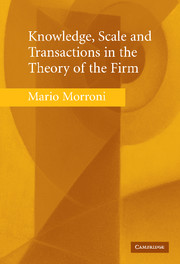Book contents
- Frontmatter
- Contents
- List of figures
- List of tables
- Acknowledgements
- Introduction and summary
- 1 Basic conditions
- 2 Decision-making
- 3 Organisational coordination
- 4 Wrestling with uncertainty
- 5 Uncertainty-decreasing strategies within firms
- 6 Conclusion: growth of the firm as the interplay between the three aspects of organisational coordination
- Glossary
- References
- Author index
- Subject index
5 - Uncertainty-decreasing strategies within firms
Published online by Cambridge University Press: 15 December 2009
- Frontmatter
- Contents
- List of figures
- List of tables
- Acknowledgements
- Introduction and summary
- 1 Basic conditions
- 2 Decision-making
- 3 Organisational coordination
- 4 Wrestling with uncertainty
- 5 Uncertainty-decreasing strategies within firms
- 6 Conclusion: growth of the firm as the interplay between the three aspects of organisational coordination
- Glossary
- References
- Author index
- Subject index
Summary
This chapter tackles a key question that has been indicated, but not discussed in detail, in chapter 4: in what circumstances and in what ways are firms able to face radical uncertainty and mitigate its costs? This question is ignored in many theories of the firm because it makes formalisation difficult (or impossible). Nonetheless, we cannot fail to address radical uncertainty because an answer to this question is absolutely crucial for a full understanding of organisational boundaries and behaviour. It is worth repeating that focus on hard-to-treat environmental conditions is motivated by the fact that radical uncertainty stands at the heart of the firms' functioning and growth, since business organisations may be regarded precisely as a response to radical uncertainty. Firms are useful instruments to prepare for an uncertain future, for two main reasons: (i) they are constituted by assets, such as equipment, warehouses and capabilities, that may represent useful reserves to face unpredicted contingencies; and (ii) they are based on long-term relational agreements that allow flexibility, the managing of conflicting interests among their stakeholders, simplification and learning. Section 5.1 of this chapter considers the role of reserves and relational agreements. In section 5.2 a particular type of relational agreement, the employment relationship, is analysed. Sections 5.3–5.6 investigate the properties of simplification and learning processes that are favoured by the employment relationship. Simplification and learning are two mutually related ways adopted within firms to face radical uncertainty.
Information
- Type
- Chapter
- Information
- Knowledge, Scale and Transactions in the Theory of the Firm , pp. 205 - 239Publisher: Cambridge University PressPrint publication year: 2006
